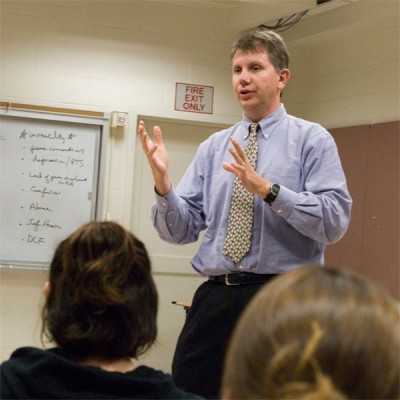
Every battlefield has yielded its share of wounded warriors, but in the aftermath of U.S. involvement in Vietnam, the Gulf War and the conflicts in Iraq and Afghanistan, veterans with disabilities now receive as much attention for their cognitive and psychological impairment as they do for their physical wounds. For Neag Associate Professor Joseph Madaus, that attention must include greater opportunities for a college education.
Madaus, director of the Neag School’s Center on Postsecondary Education and Disability, served last year as the editor of a special issue of the Journal of Postsecondary Education and Disability, devoted to veterans with disabilities and their transition into higher education. In the journal, and in his work, Madaus advocates for an attitude change in the way colleges deal with combat veterans with disabilities. “More and more of these men and women are coming back to school,” he says. “But if colleges follow their strict documentation requirements for students with disabilities, and are reactive instead of proactive, many of these veterans could be left out when it comes to disability services. Business as usual,” he adds, “will not work.”
The disabilities in question are what Madaus calls the “hidden” type, including combat-related Traumatic Brain Injury, Post-Traumatic Stress Disorder and depression. With reasonable accommodations and modifications, many students with a broad spectrum of disabilities have demonstrated for years that learning is possible, as are successful outcomes. Now, he says, the focus must be on similar services geared toward the needs of combat veterans.
In writing for the journal, Madaus and his co-authors challenge colleges to rethink their approaches to dealing with veterans with disabilities. They urge that college Disability Service (DS) offices move away from a “medical model,” with strict documentation of a disability, toward a more “social model” that allows for a broader interpretation of guidelines within the GI Bill of Rights and the Americans with Disabilities Act. “The movement away from the medical model,” they write, “could greatly reduce the stigma associated with veterans requiring reasonable accommodations. Individuals who might go without seeking assistance might decide to pursue accommodations if the process were less rigid.”
He also suggests that veterans could be helped by what he calls a “campus champion” advocating for their cause. A college’s DS office is a logical starting point. “DS offices that had excellent campus working relationships,” Madaus writes, “have made great strides in molding campuses into a more welcoming and universally accessible environment for veterans.”
But much more remains to be done, and expanding that welcoming environment should be the next priority for DS providers. Their advocacy, says Madaus, must now carry over to meeting the more nuanced needs of today’s veterans with disabilities. “I would encourage DS providers to get involved, examine how they’re doing things, collaborate with other offices and become leaders on their campuses to improve services.”
Those improvements could have an impact that goes well beyond veterans with disabilities. Positive changes that begin with a small group of students often produce benefits that extend campuswide. “Those with disabilities,” Madaus says, “provide the benefit of increased diversity on campus. I believe that the presence of these veterans at any college or university enhances the overall education of the entire student body.”
 Facebook
Facebook Twitter
Twitter  LinkedIn
LinkedIn
As a PTSD survivor I applaud this approach to helping veterans return to school and suceed. Although my PTSD was not a result of war, it did impair my ability to work, interact with others and to concentrate. With mental health support and accomodations at work I was able to continue to work. Persons suffering from this trauma disorder need a great deal of support. Since there is no outward sign of the disorder, most people assume that the sufferer is fine. The flashbacks, unexpected triggers and the overwhelming sadness would certainly impact the students. At times the student could seem to be just “slacking” or not being motivated enough to put the effort in to the class. Professors, tutors and even fellow students (always respecting the privacy of the individual) in the case of group work would need to have a clear understanding of the nature of PTSD>
I can see that without a strong support system, students could find the whole process of just enrolling too much to handle. As a graduate of UCONN I would hope the Universtiy would be a leader in this area.